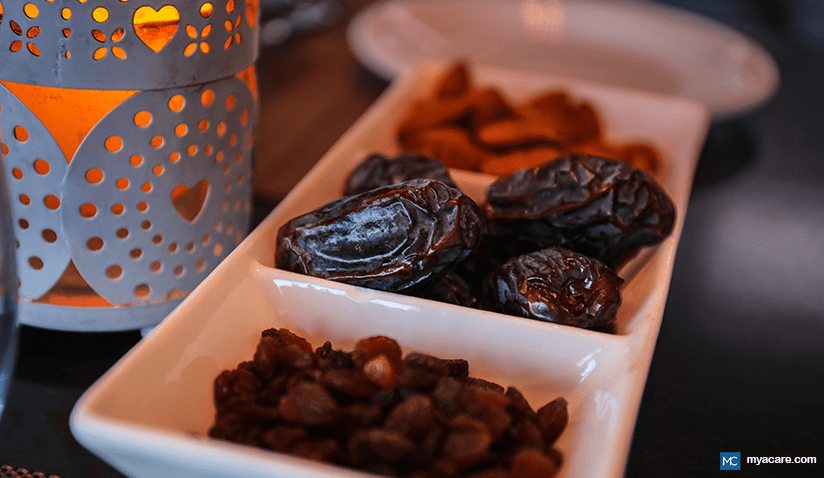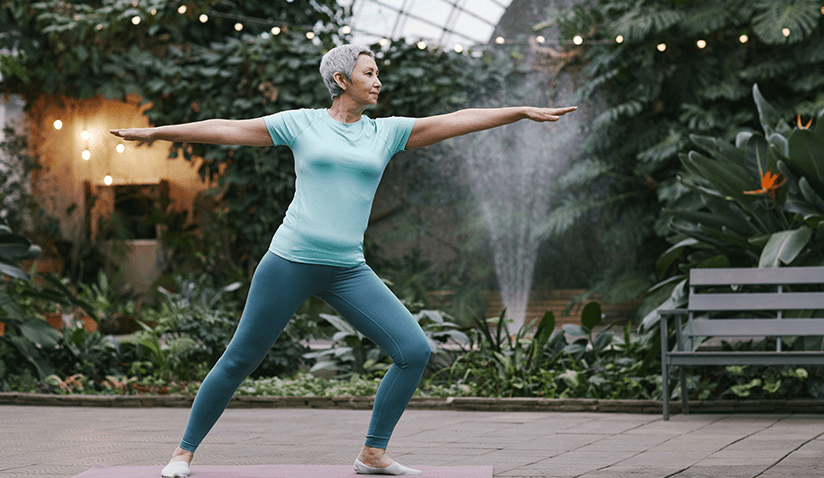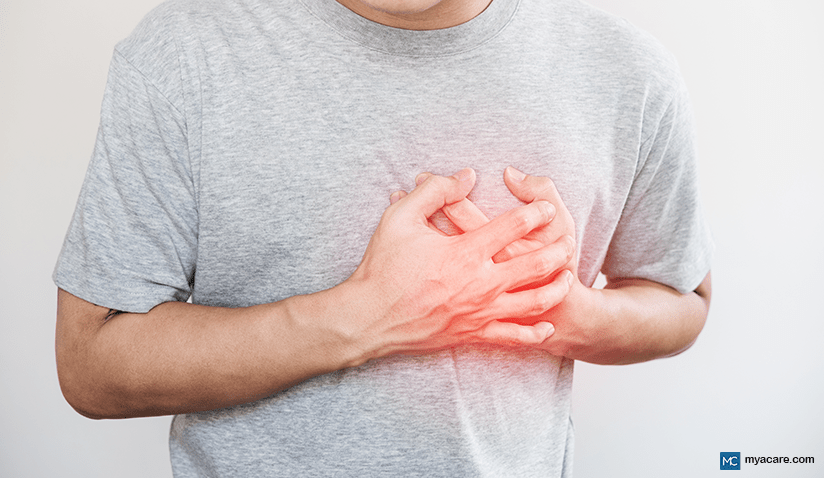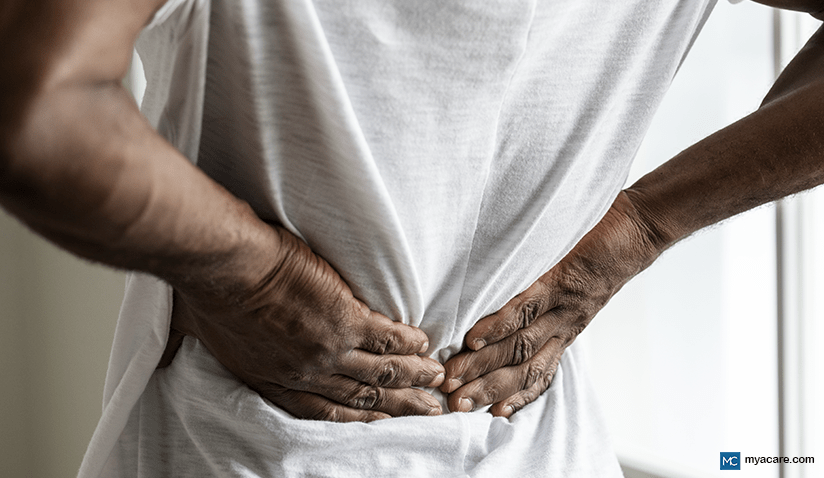STAYING HEALTHY DURING RAMADAN

Observing Ramadan fasting could be an effective way to promote health provided you stick to healthy eating habits. Here's how you can get the best of it.
Fasting during Ramadan is a fundamental pillar of Islam. According to Islam, all healthy adult Muslims should fast for 29 to 30 consecutive days each year. The fast begins at dawn and ends at sunset every day.
During the non-fasting periods, which extend from sunset to just ahead of dawn the next day, they can eat freely. Typically, there are at least two meals one can take during Ramadan fasting. They are the pre-dawn meal (Suhoor) and a meal at dusk (Iftar).
Many of nearly 1.5 billion Muslims across the globe fast during Ramadan. It is important to eat healthily to prevent health issues and promote health.
What Happens to Your Body during Ramadan Fasting?
Ramadan fasting is similar to other types of fasting that require you to refrain from foods and beverages for an extended period. However, it carries enormous religious value and cultural importance. In fact, it is associated with one’s spirituality.
The fasting period during Ramadan can range anywhere from 10 to 22 hours. The duration depends on the country you live in. In any case, this is a long time to go without foods/beverages.
When you fast for more than eight hours, your body begins to look for energy sources other than glucose. Because you have not taken any foods that provide glucose, your body will start using its glucose reserves in the liver to meet the body’s energy demands.
Once the body uses all its glucose reserves in the liver, it starts burning fat. This is one of the reasons fasting can aid weight loss.
Potential Benefits of Ramadan Fasting, According to Science
Weight loss
Weight loss is possible if a healthy regime is followed. This is because Ramadan routine can be similar to intermittent-fasting. However, a 2014 study by the US National Library of Medicine found that fasting during Ramadan resulted in significant weight loss across genders, but the weight loss lasted no longer than two weeks after Ramadan. If a healthy regime is maintained after Ramadan. it is possible that weight loss can be maintained.
Reduced blood fat levels
Researchers have noted mixed results regarding the effects of Ramadan fasting on blood fat levels. Moreover, the effects seem to vary depending on the gender as well.
One study compared the pre-Ramadan levels of fats in the blood with post-Ramadan values. The researchers in this study found that one month of fasting caused lower levels of total cholesterol (TC) and triglyceride (TG) in men and increased the “good” cholesterol (HDL) levels in women.
In a 2012 study, athletes who observed Ramadan fasting achieved lower levels of TC and the “bad” cholesterol (LDL). Likewise, they also had increased HDL levels.
Effects on Blood Glucose Levels
Taking fewer calories during the fasting period lowers blood glucose levels. Several studies have found that blood glucose levels decrease during the first few days of fasting and become stable by the third week of fasting.
Interestingly, researchers also observed an increase in blood glucose levels towards the end of fasting.
Key Takeaways
Ramadan fasting can have favorable effects on various health parameters. Nonetheless, the results from these studies should be interpreted with caution because the effects are short-lived and tend to return to normal levels as you get back to your usual eating habits.
Risks of Ramadan Fasting
For an otherwise healthy adult, Ramadan fasting has no significant health risks. That said, certain people might be at a greater risk of developing complications from prolonged hours of eating and drinking nothing.
These include children, people with long-term illnesses, elderly people, pregnant, menstruating or breastfeeding women, and people taking certain medications. If you have a certain condition or disease but want to fast, make sure to talk to your doctor.
Why It’s Important to Stay Healthy and Not Overeat?
Healthy eating is essential to maintaining health and preventing diseases irrespective of age, gender, or religion. It is even more important to take care of the foods you eat and drink when you fast hours every day for a month.
If you fail to provide your body with essential nutrients during Ramadan fasting, you might become more vulnerable to certain medical conditions. These include dehydration, stomach problems, headaches, weight issues, and emotional problems.
Below is a guide to healthy eating during Ramadan that you can consider.
Eating at Iftar
This is the time when you break the fast at dusk. Make sure to consume plenty of fluids to avoid dehydration and natural sugar-containing foods to ensure a consistent energy source. Do not consume high-fat foods and foods with added sugars, as they will negatively affect your energy balance.
Start with plain water, milk or fruit juices. Water hydrates your body without pumping calories into the body. Milk and fruit juices are great for providing natural sugars and limiting your calorie intake. Once your digestion normalizes, you may take fruits.
Eating dates is a traditional way to break the fast. Dates are rich sources of natural sugars, potassium, copper, manganese, and fibers. You could also get incredible health benefits from eating dried fruits. Consider apricots, figs, raisins or prunes.
In many Arabian countries, people consume soups to break the fast. Warm soups soothe stomach linings and help your digestion return to normal. Consider adding colorful vegetables such as carrots, tomatoes, pumpkins, bell peppers, spinach, zucchini and eggplants to soups.
Prepare soups using moderate amounts of salt and oil. You may also add flavor with fresh herbs.
Eating after breaking the fast
Eat a nutrient-rich meal that contains generous quantities of starchy foods, fruit and vegetables, dairy and protein-rich foods. Examples can include rice with a curry made of fish, meat, vegetables, and pulses.
There is always a greater risk of overeating during this period, as you want to treat yourself after being hungry for hours. However, this does not mean you should end up devouring plates of those fatty and sugary foods all at once.
Keep in mind that you only have a few hours each day to feed your body. Thus, the quality of the foods you take is critically important to your health.
Two to three hours after you have taken your meal, you may consider going for a walk or doing some light exercise to help digestion.
Eating at Suhoor
Suhoor, the pre-dawn meal, is key to helping your body stay charged until the next meal at Iftar.
The two major components of Suhoor include:
1. Fluids
Fluids and water hydrate your body and help prevent dehydration. Make sure to take plenty of water and fluids so that you remain hydrated for the entire day.
2. Energy-dense and fiber-rich foods
Because you are going to eat and drink nothing for the next several hours, you need to provide your body with consistent energy supply and nutrients. Whole-grains and starchy foods are the best for this purpose.
Below are some foods to consider.
- Oats, wheat, lentils, and grains contain certain sugars called complex carbs. Unlike simple sugars such as those found in sugary drinks, complex carbs do not cause an energy crash. Moreover, they also help maintain steady blood sugar levels, which helps maintain your energy levels for longer durations. You can add water, milk, or yogurt to these whole-grains. For an additional energy source, consider adding fresh or dried fruit, nuts or seeds as toppings.
- Cereals, dates, figs, bran, grains, seeds, potatoes, vegetables and fruits. These fiber-rich foods slowly release glucose into the bloodstream so that you will feel energized for longer durations. In addition, vegetables and fruits contain mineral, vitamins, and other nutrients necessary for maintaining health.
- Yogurt is a good source of healthy bacteria, protein, calcium, iodine and B vitamins. Besides, it is also rich in the fluid.
- Eggs, cheese, and meat. These high protein foods provide long-lasting energy and help maintain your energy levels.
Key Highlights
- Drink plenty of fluid and water. Drink at least 8-12 cups of water a day.
- Go easy on high-fat, high-sugar and caffeinated foods and beverages.
- Do not skip Suhoor.
- Eat foods that are energy-dense and rich in fiber.
- Do not overeat.
- If you have a medical condition or disease, consult your doctor first.
To search for the best healthcare providers worldwide, please use the Mya Care search engine.
Sources:
- Gov.uk. Healthy fasting during Ramadan. Retrieved April 18, 2019.
- Journal of Research in Medical Sciences. Is Ramadan fasting related to health outcomes? A review on the related evidence.
- Asian Journal of Sports Medicine. Effects of Ramadan Fasting on Biochemical and Anthropometric Parameters in Physically Active Men.
- Iranian Journal of Basic Medical Sciences. The effect of ramadan fasting on biochemical and performance parameters in collegiate wrestlers.
- The Effect of Ramadan Fasting on Fasting Serum Glucose in Healthy Adults.
- Journal of Family and Community Medicine. Ramadan fasting is not usually associated with the risk of cardiovascular events: A systematic review and meta-analysis.
- World Food Programme. 10 Ways to Stay Fit and Healthy During Ramadan.
- https://gulfnews.com/uae/take-advantage-of-ramadan--lose-weight-1.2232668
Disclaimer: Please note that Mya Care does not provide medical advice, diagnosis, or treatment. The information provided is not intended to replace the care or advice of a qualified health care professional. The views expressed are personal views of the author and do not necessarily reflect the opinion of Mya Care. Always consult your doctor for all diagnoses, treatments, and cures for any diseases or conditions, as well as before changing your health care regimen. Do not reproduce, copy, reformat, publish, distribute, upload, post, transmit, transfer in any manner or sell any of the materials in this blog without prior written permission from myacare.com.



